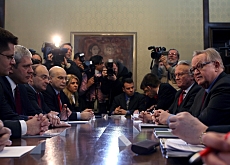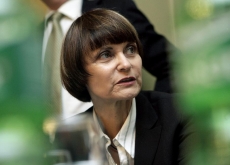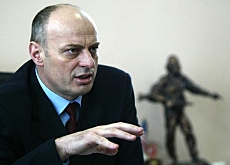Swiss expert criticises Kosovo proposal

Thomas Fleiner, a Swiss legal expert who is advising the Serbian government on Kosovo, has criticised the latest proposal on the future of the disputed province.
Fleiner told a newspaper the plan presented by the United Nations special envoy to Kosovo, Martti Ahtisaari, might result in a pressure-based solution and therefore more ethnic conflict.
The Swiss foreign ministry has, however, welcomed Ahtisaari’s recommendations.
The 90 per cent ethnic Albanian majority want Kosovo to break away from Serbia, but this is rejected by Belgrade, which wants the province to remain part of the country.
Ahtisaari’s plan, presented on Friday, recommends that Kosovo should be able to govern itself democratically and make international agreements.
It did not explicitly mention independence, but observers have hailed it as taking the first tentative step on the road to possible statehood. The proposal has already been rejected by the president of Serbia.
In an interview published in Saturday’s edition of Le Temps, Fleiner said he was not optimistic about the plan.
“For me the only solution for Kosovo is to clearly reach a consensus between the parties and not a limping compromise resulting from international pressure,” the head of Fribourg University’s Institute of Federalism said.
Vienna meeting
Ahtisaari has called a meeting between the two sides in Vienna later this month in which both sides are, according to the UN envoy, to be given one more chance to find a compromise.
However, Fleiner said that this was putting too much pressure on the Serbs and could be exploited by the nationalists, the big winners in the last parliamentary elections.
He said that in ethnic conflicts it was often the process and negotiations that counted more than the final solution and that the international community could learn its lessons from the situations in Cyprus and in the Middle East.
For her part, Swiss Foreign Mininster Micheline Calmy-Rey has several times stated her support for Kosovo’s independence.
Fleiner called on the government to continue its efforts, but emphasised that for now Serbia did not consider Bern to be neutral in the matter.
A foreign ministry spokesman, quoted in Le Temps, said the ministry welcomed Ahtisaari’s latest recommendations.
Switzerland has not participated in the official negotiations but has collaborated wit the UN envoy by giving him assistance on decentralisation and protection of minorities issues, spokesman Philippe Jeanneret was quoted as saying.
UN administration
The UN has administered Kosovo since a Nato bombing campaign forced out Serbian troops in 1999.
Talks on the province’s future and status have been continuing for years without the two sides coming to agreement.
Under Ahtisaari’s plan, Kosovo could raise its own flag, with its own national anthem and other symbols.
But an “international community representative” would be appointed, with powers to intervene if Kosovo tried to go further than the plan allowed, while Nato and European Union forces would remain in military and policing roles.
The UN Security Council will have the final say on whether to adopt the plan.
swissinfo with agencies
Legal expert Thomas Fleiner has been head of Fribourg University’s Institute of Federalism since 1984.
The Serbian government appointed him a legal advisor in November 2005.
Fleiner has already taken part in moves surrounding the former Yugoslavia. He collaborated with the Serbian authorities during the creation of Serbia and Montenegro in 2003.
Swiss Foreign Minister Micheline Calmy-Rey has expressed support for Kosovo’s independence since 2005, saying that its current status under the UN administration was not satisfactory.
But she said independence could only take place after dialogue between the difference parties, in particular with Serbia.
Calmy-Rey’s comments have prompted protests from Belgrade and within Switzerland, with some parliamentarians accusing her of having gone against the Swiss tradition of neutrality.
In total, around 200,000 people from Kosovo live in Switzerland.

In compliance with the JTI standards
More: SWI swissinfo.ch certified by the Journalism Trust Initiative


You can find an overview of ongoing debates with our journalists here. Please join us!
If you want to start a conversation about a topic raised in this article or want to report factual errors, email us at english@swissinfo.ch.